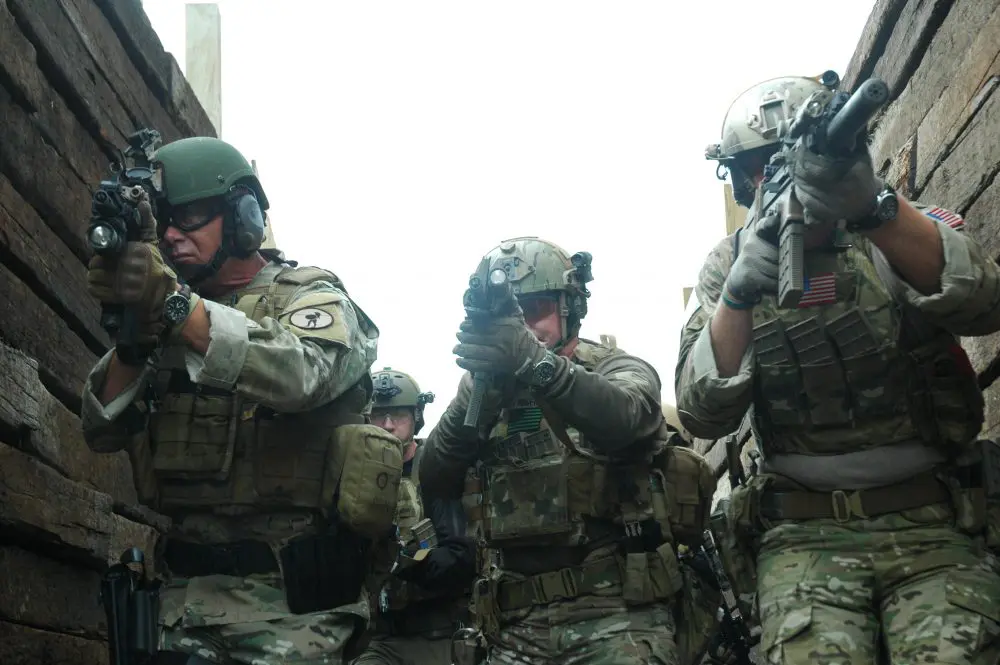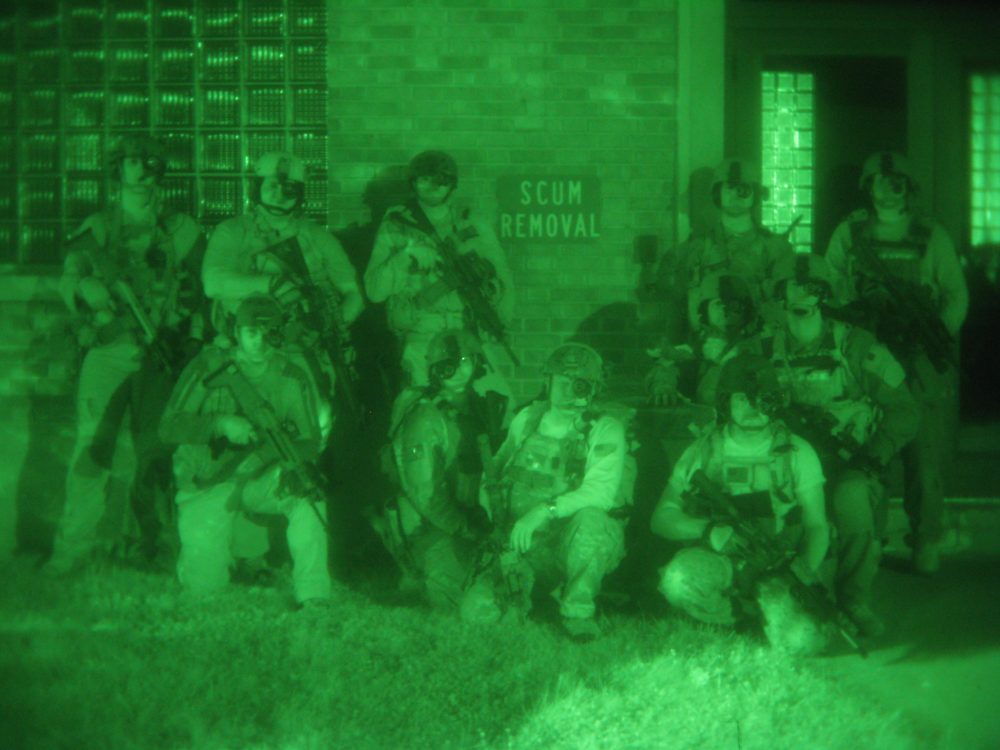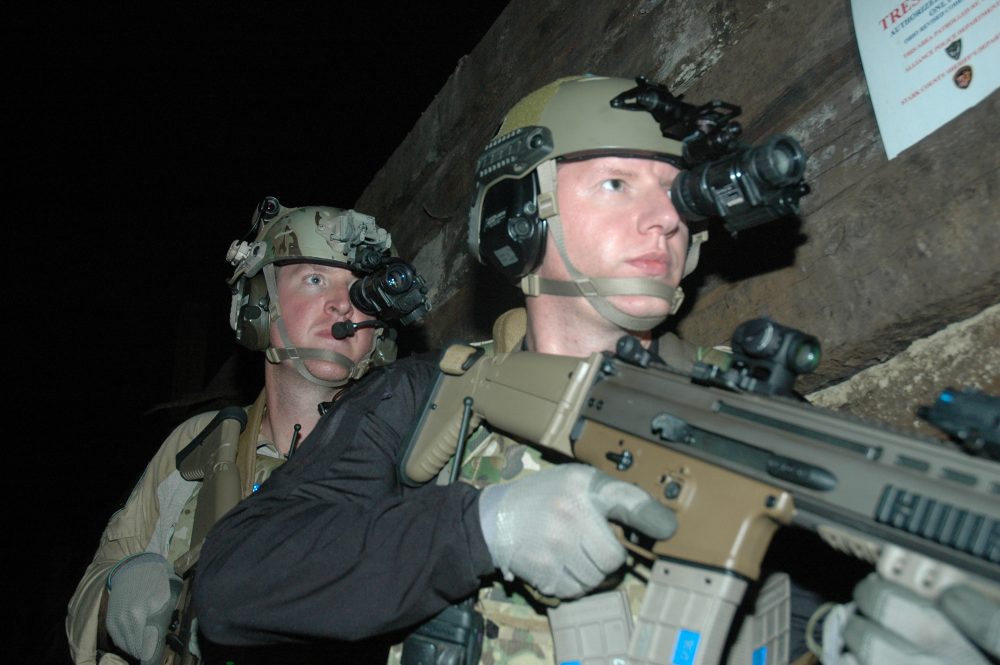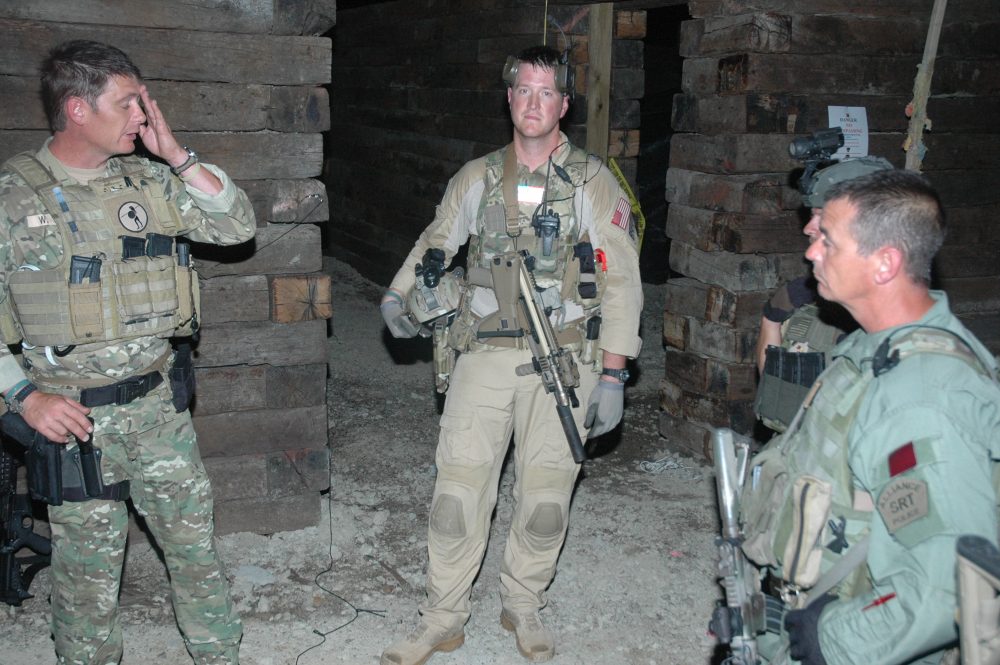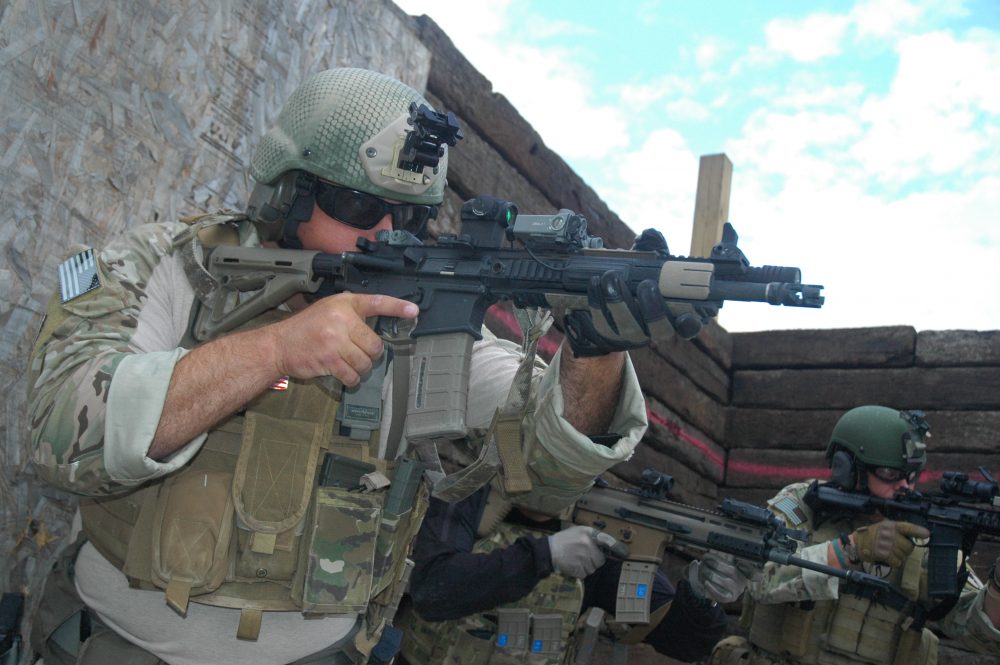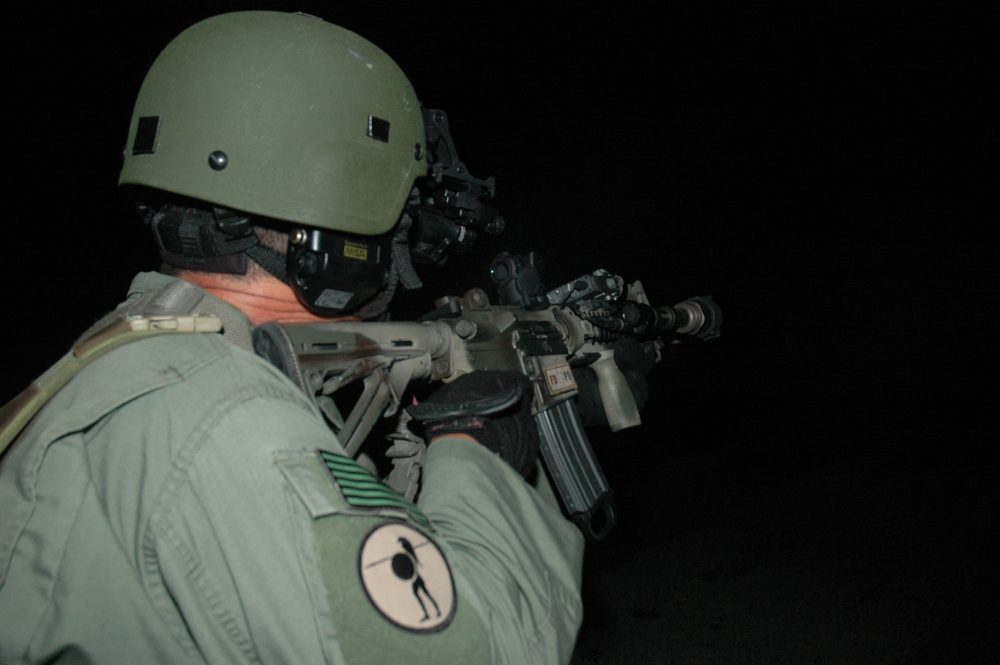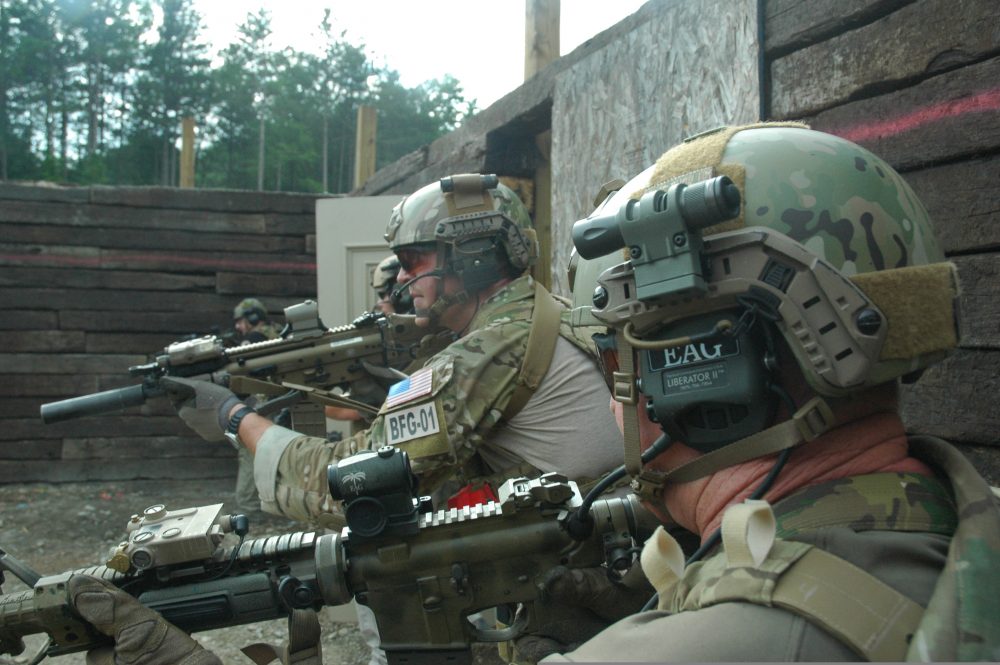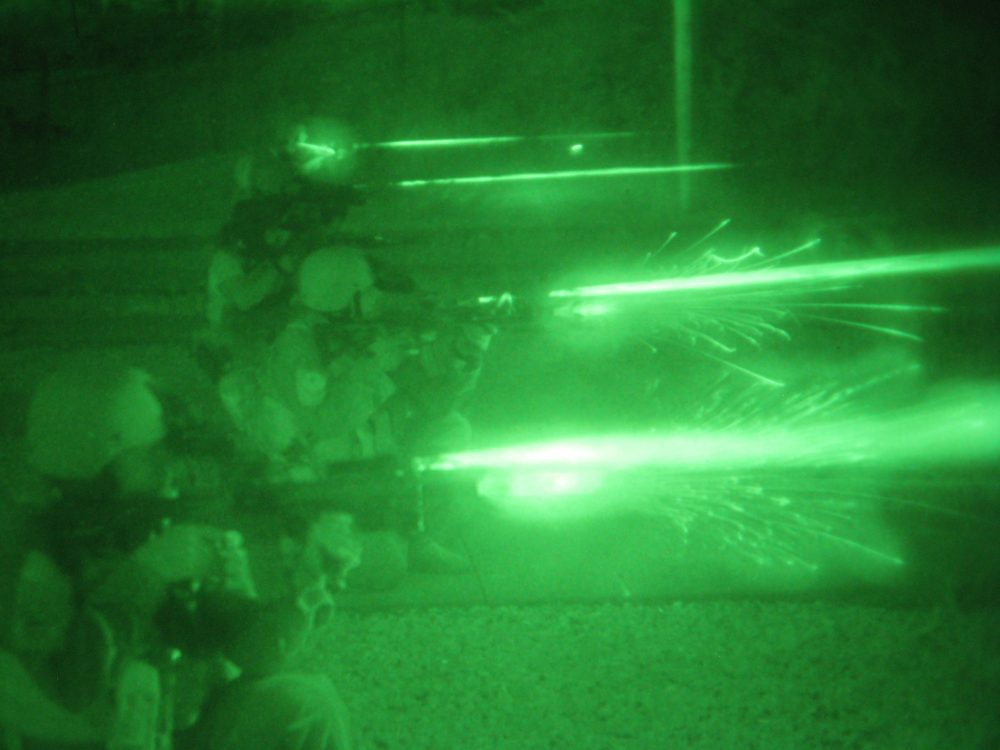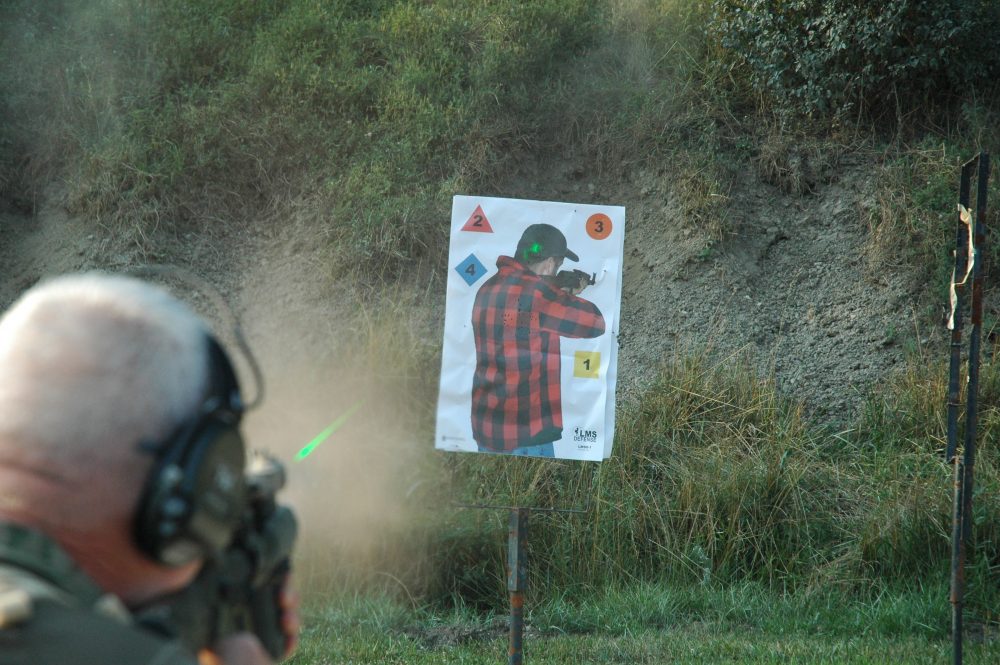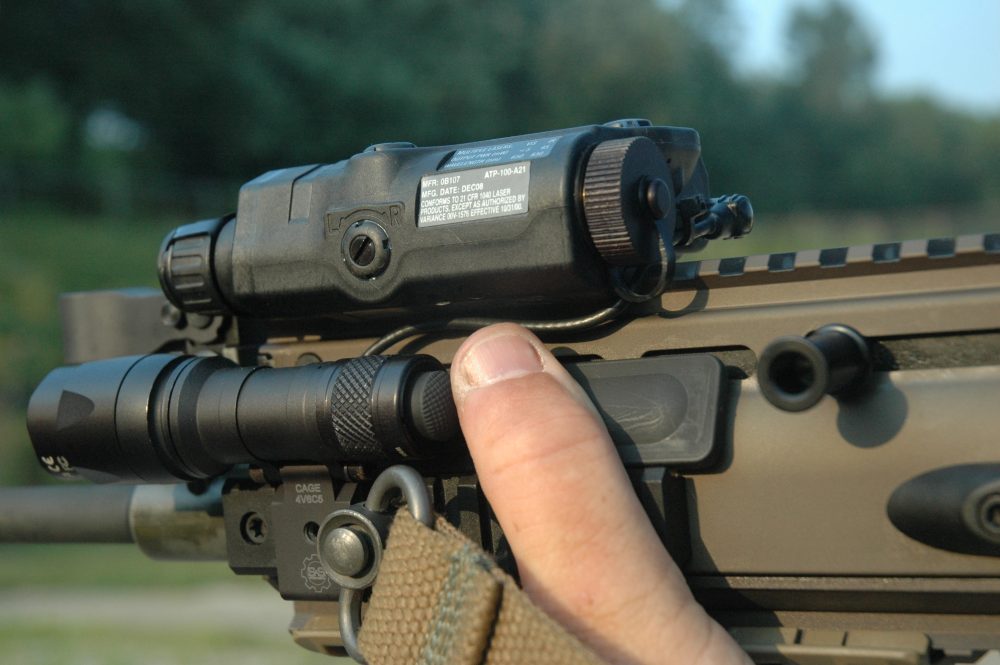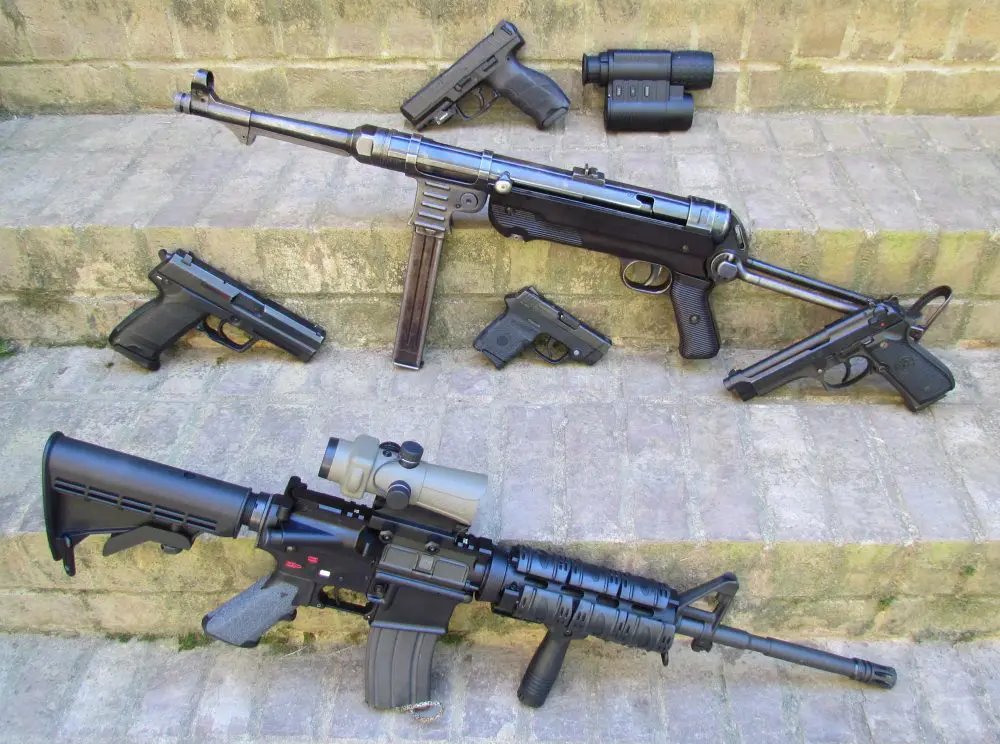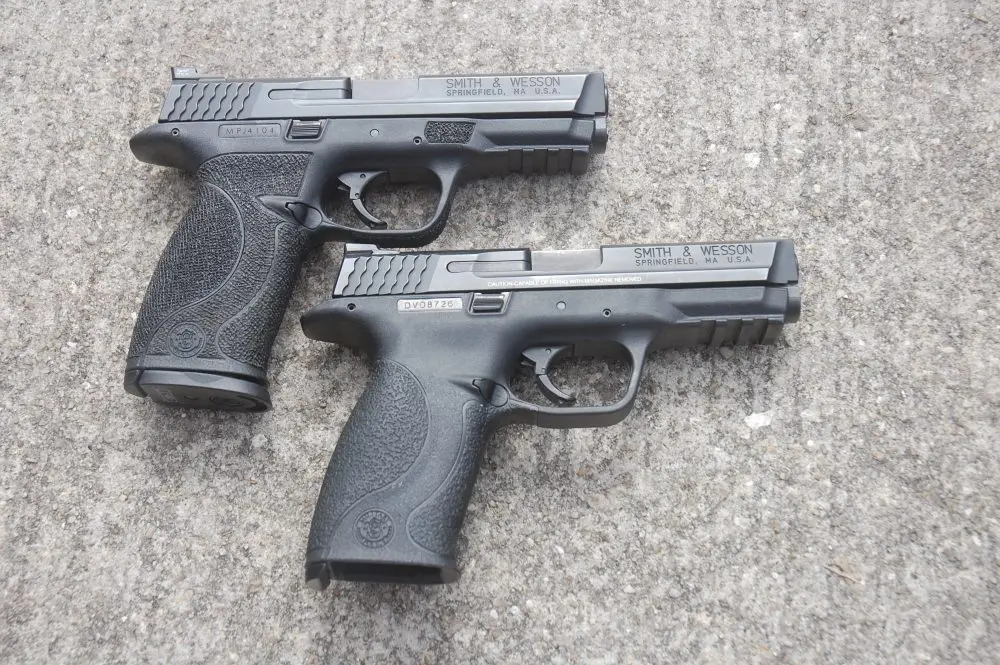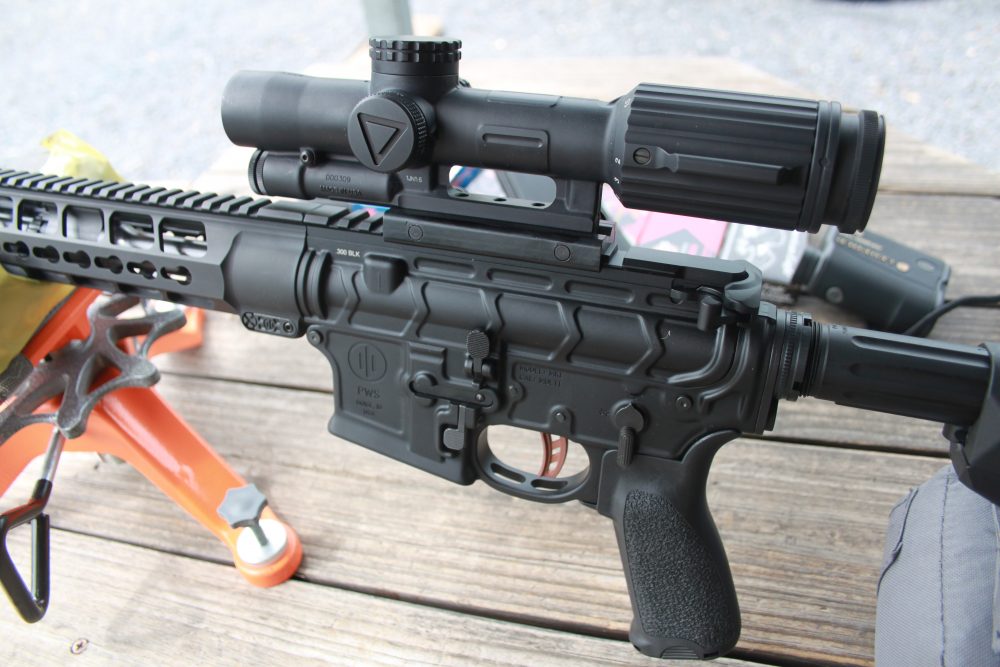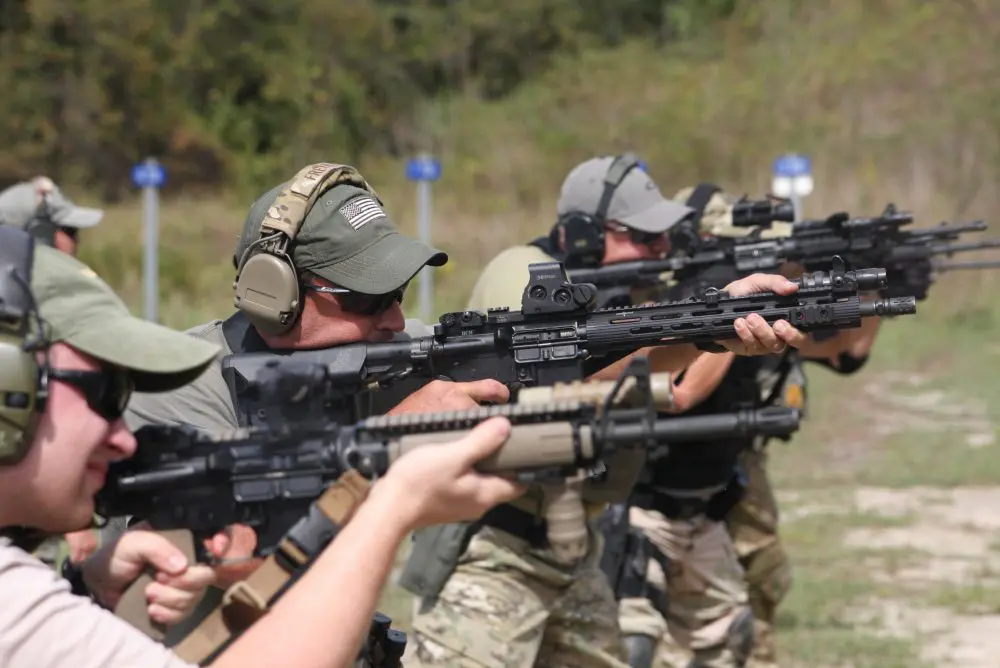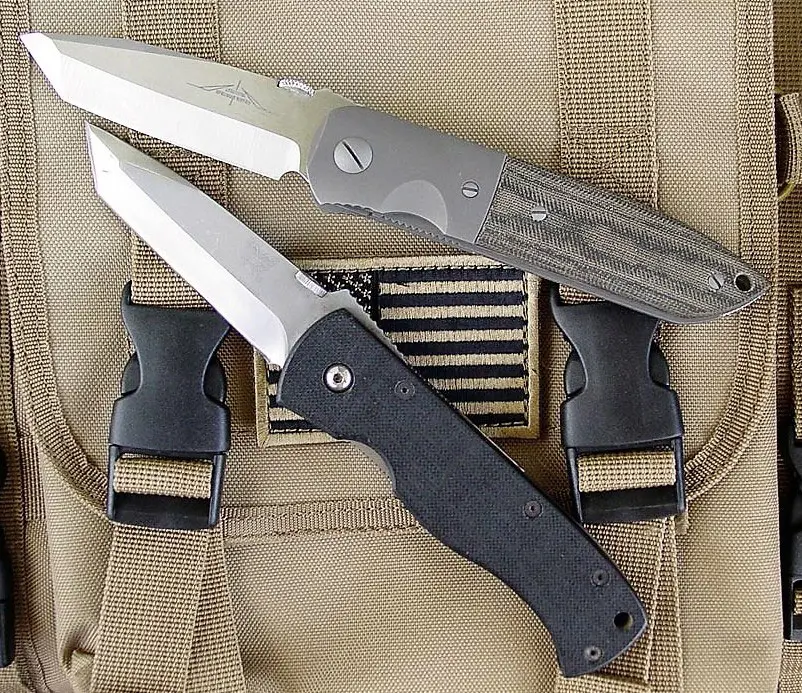Class photo. Alliance PD range is located with city waste treatment plant. This building may be apropos for many reasons. Photo: John Chapman
Proficiency comes only after good initial training is coupled with regular sustainment training, which is necessary to keep you current not only with new technology, but also with new TTPs.
The current war against the Islamofascists will be with us for a long time and, though war is terrible, it is often necessary. War will exist as long as this Earth rotates.
With war come technological advances, and close combat provides the arena in which technology enhances our ability to more efficiently kill the bad guys.
Advances in night vision were slow in the beginning. I can remember the first time I saw a Starlight scope on top of the CP Bunker on Hill 22, 45 years ago. We have come a long way since then.
Night vision is of course expensive, and its primary users are the military. However, the technology is slowly spilling over into the LE community. Very slowly.
Shrinking budgets, risk-averse administrators, and politicians who prefer to have nothing happen during their term of office (unless it involves the good citizens and cops, in which case they will throw the cops right under that Greyhound) will limit the further use of night vision.
Clint Lynch and Stephan Hilliard stack up on a door. Stephan is the design guy at Blue Force Gear, and Clint is an engineer on the Mk16 and Mk 20 rifles at FNMI. Imagine that: guys who work in the business actually in class running the gear that they design. Both are top-shelf guys and great shooters.
My time available to receive training is limited, and I try hard to spend both my time and money wisely. I have not been under night observation devices (NODs) for anything other than refresher use for five years now, so when John “Chappy” Chapman advised that he was going to do a Low Light/No Light course, it was game on.
The training was hosted by the Alliance Police Department, and many of those who attended were from the APD Special Response Team. Alliance is a small department with approximately 50 sworn members, but it is very forward-thinking and has an excellent firearms training program. Likewise its SRT is very progressive in both training and operational use.
John Chapman is a super-busy Type A+ personality that is common within specific portions of our society. A retired police lieutenant, he owns LMS Defense, which is both a training company as well as a service provider OCONUS. Chappy is also a combat developer for several defense manufacturers, including Laser Devices and Nightline Nightvision.
Bill Toy, a retired Ranger and former PMC whose keen perceptions provided copious insights for the class, supported Chappy.
Instructor Bill Toy (left) debriefs after shoot-house run.
Medical support was provided by Mike Griffin (owner, Austere Provisions Company), who works as a medic for LMS Defense. Mike was also a student in this class, and it was great having him on our team.
Chappy made sure we understood that this was not a CQB class, although aspects of the class did include CQB. The emphasis was on understanding and properly using the night-vision technology that, when integrated with the appropriate weapon system, will allow the user to win the fight.
The technology used in this class included NODs. These were mostly helmet AN/PVS-14s (though Chappy had a set of AN/PVS-15s). The -14 is a monocular worn over the non-dominant eye, and the -15 is a dual tube unit.
The -14 is an image intensifier, meaning it takes available light and turns it into something you can use. As such it is passive, but without some ambient light, it leaves you in the dark (literally). The unit has a low-powered IR illuminator, but many in the class also used a helmet-mounted IR flashlight like the SureFire M1.
Chappy with PWS piston gun during shoot-house run. Product Improved DBAL-A2 Green is in front of his Aimpoint T1.
All hands were required to have a weapon-mounted IR laser. The majority were Laser Devices DBAL-A2 (aka AN/PEQ-15A). Two used the Product Improved DBAL-A2 Green (a much improved unit using a green visible laser). Two ran ATPIALs (aka AN/PEQ-15), though these two units did not have the high-power IR setting. There were several of the legacy AN/PEQ-2s and one legacy AN/PAQ-4.
The legacy units worked well within the parameters of this class, but the supremacy of the Multi Function Aiming Lasers (MFAL) cannot be ignored.
The MFAL have an integral visible laser as well as an IR laser, and both are slaved to each other. This means that adjusting one will adjust the other. While this may not sound like much, it means that you can BZO the unit during daylight (using the visible laser), which is a major plus. The aggravation of getting a zero on the older PEQ-2 is now a distant (and unpleasant) memory.
The MFAL also has an integral focusable IR illuminator, giving the shooter the ability to cast some IR light onto the target.
Det. Mike Jones of APD SRT runs his carbine during square-range drill under NODs. He is using a Laser Devices DBAL-A2 Multi Function Aiming Laser and has a SureFire M952 Light with an IR filter for additional illumination.
Some students had issues with switchology (to include the location of the various switches), which was not unexpected. Having an habitual association with your gear reduces the opportunity to fumble, especially in the dark.
As the title suggests, this was not a daytime class. It operated on a reverse schedule, with start times of 1800 and running clear through to 0500 on some nights. For those who consider working at night uncomfortable, it can be a shock. For those who are hunters (of men, not Fudds), it is the time when you can bring scunion down upon those requiring it.
LMS expects you to have a rifle that is zeroed. This is not an unrealistic expectation, and it saves a buttload of time.
We started off with a very neat drill to ascertain the competence of the shooters for the task at hand. It required loading a specific number of rounds in each magazine and right out of the gate, I managed to access the wrong magazine.
Both Rogers and Hilliard wore Ops Core helmet. It’s extremely stable—especially useful when wearing NODs—and lighter than the ACH.
We ran a succession of drills in daylight and low light, and then moved into the use of NODs, to include nomenclature and adjustment of the lens.
We spent a fair amount of time moving in team formation in order to get people somewhat comfortable with maintaining situational awareness under NODs. This was enhanced when we went to an infrastructure target site within the city. This single drill on Training Day 1 (TD1) brought a lot of moving parts together and, more importantly, identified both limitations in the gear (lack of depth perception, restricted field of view, limited peripheral vision) as well deficiencies in communication and tactics on the part of the students.
The remainder of the class continued a pattern that was conducive to learning. Lectures were followed by practical application. The drills became increasingly complex until we stopped for another lecture on an additional technique.
The constant pushing kept people out of their comfort zone and made us all put on our thinking caps (thinly disguised as the Dome of Obedience).
Square-range drills under NODs. Two closest shooters are firing their M4s while using both IR Illuminator and IR Laser Aimer. Two farthest shooters are using only IR Aimer.
We spent a lot of time on the square range developing an habitual association with our NODs and lasers, both visible and IR. For those who have spent their entire shooting careers looking at the guns as they reloaded (à la the shooting games), this was somewhat of a challenge.
Hits on the APD Shoot House became more complicated and eventually worked into both teams making entry simultaneously—one as shooters and one as trailers.
The final day concluded with working stairs in the infrastructure site. Five full stories of stairs….
By the end of the course, all hands were wiped out. Walking up and down stairwells can be strenuous. Walking up and down stairwells as part of a team, fully jocked up and under NODs, can be something else.
At the staging area, people were dumping water out of their boots and wringing out a glassful of moisture from their gloves.
DBAL-A2 Green 50mW visible laser is extremely bright, even in daylight.
The amount of information was somewhat daunting. That firehose opened up the very minute the class started and shut off only after we wrapped up in the early morning of TD3. As with all teaching, students could absorb only a small percentage of what was imparted. Note taking during class is tough, but I and jotted down bullet points back in the hotel room before drifting off into blissful nirvana.
When I awoke, I went back to those one-liners and fleshed them out. Eventually I wound up with something worthwhile. This may or may not work for you, but is worth considering.
This course was moderately active, and the requirement to wear armor made it more so. You didn’t need to be a stunning physical specimen to complete the class, but it sure would help. Throughout the course, Chappy and his crew were constantly monitoring the students for those telltale signs of a soon-to-occur problem.
Mike Griffin handed out to each student a neat little package that contained numerous very useful items, including a tourniquet (you never have enough tourniquets) and several packets of Vitalyte, an electrolyte replacement. Proper hydration requires electrolytes, and there is no doubt that this kept some of the lads functioning.
LESSONS LEARNED
It had been a long time since I’d been under NODs except for refresher training. I need to do this class again—soon—in order to solidify my knowledge base.
I need to run the -14 outside more. An example would be walking the dog at night. This would expand my situational awareness when wearing NODs and perhaps would have prevented my face plant at class when I tripped over an obstacle in training. Normal peripheral vision is 190 degrees. With NODs, it is about 40 degrees. Habitual association with the gear and consistent sustainment training make it work.
This switched-on shooter has an efficient set-up. Mini Scout Light on his SCAR-L uses click on/off switch. Tape switch for his AN/PEQ-15 is likewise operated by same thumb. Good switchology makes for less fumbling when you need to be shooting.
No matter how satisfied I am with my gear, I will invariably reconfigure it at or shortly after attending a class. What works well for me as an instructor does not often work well for me as a shooter.
A special thanks to the Alliance PD, especially Detective Mike Jones (also a S.W.A.T. author) and the members of his SRT, who are consummate professionals.
This was a great course and I learned a lot. The staff clearly knows night vision and how to integrate it into fighting in low/no light. The students were all professionals, and the interaction during the breaks and at dinner resulted in a lot of good information being passed on. All good classes have this type of camaraderie, and it enhances the experience.
If you use or are issued night vision, I highly recommend this class.
[Pat Rogers is a retired Chief Warrant Officer of Marines and a retired NYPD Sergeant. Pat is the owner of E.A.G. Inc., which provides services to governmental organizations and private citizens. He can be reached at [email protected].]
SOURCES:
LMS Defense
Dept. S.W.A.T.
1285 Baring Blvd #168
Sparks, NV 89434
(831) 236-4690
www.lmsdefense.com
Asym Ammunition
Dept. S.W.A.T.
P.O. Box 2016
Durango, CO 81302
(970) 385-7900
www.asym-ammo.com
Austere Provisions Company
Dept. S.W.A.T.
704 11th St.
Radford, VA 24141
(540) 632-2272
www.austereprovisions.com
Boresight Solutions
(305) 439-2662
www.boresightsolutions.com
Blue Force Gear, Inc.
Dept. S.W.A.T.
P.O. Box 853
Pooler, GA 31322
(877) 430-2583
www.blueforcegear.com
Crye Precision LLC
Dept. S.W.A.T.
Brooklyn Navy Yard
63 Flushing Ave., Unit 252
Brooklyn, NY 11205
(718) 246-3838
www.cryeprecision.com
Ops-Core, Inc.
Dept. S.W.A.T.
15 Channel Center Street
Boston, MA 02210
(617) 670-3547
www.ops-core.com
